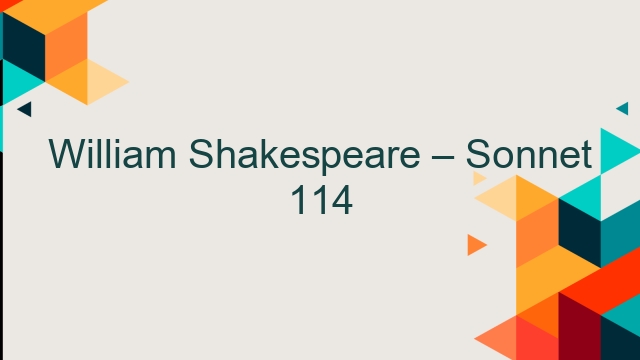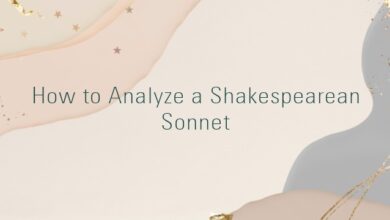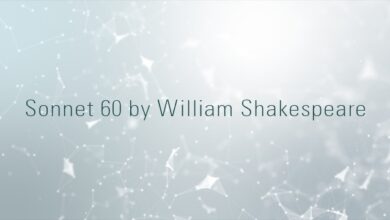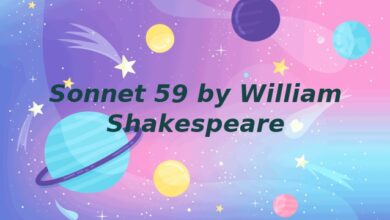
Or whether doth my mind, being crowned with you,
Drink up the monarch’s plague, this flattery?
Or whether shall I say, mine eye saith true,
And that your love taught it this alchemy,
To make of monsters and things indigest
Such cherubins as your sweet self resemble,
Creating every bad a perfect best,
As fast as objects to his beams assemble?
O! ‘tis the first, ‘tis flattery in my seeing,
And my great mind most kingly drinks it up:
Mine eye well knows what with his gust is ‘greeing,
And to his palate doth prepare the cup:
If it be poisoned, ‘tis the lesser sin
That mine eye loves it and doth first begin.
�This sonnet, taking up again the ideas of the previous one, hinges on a quasi-philosophical conundrum as to which of the two, the eye or the mind, are guilty of the greatest sin, the mind in being deceived by flattery, or the eye in transforming all base images by a sort of arcane alchemy into images of the youth. Why either of these should be regarded as sinful is not clearly stated, unless it is harking back once again to the possibility of idolatry and idolatrous loving, first raised in Sonnet 105 and made the subject of various speculations thereafter.
Here the possibility that the eye and the mind are independent (or might be so) is exploited in a way that befits the conceit of a metaphysical poem, without any sure resolution being achieved. One is left at the end doubting which of the two, the eye or the mind, is the most guilty, or indeed whether either is guilty of anything other than too much loving.
The 1609 Quarto Version
OR whether doth my minde being crown’d with you
Drinke vp the monarks plague this flattery ?
Or whether ſhall I ſay mine eie ſaith true,
And that your loue taught it this Alcumie?
To make of monſters,and things indigeſt,
Such cherubines as your ſweet ſelf reſemble,
Creating euery bad a perfect beſt
As faſt as obiects to his beames aſſemble:
Oh tis the firſt,tis flatry in my ſeeing,
And my great minde moſt kingly drinkes it vp,
Mine eie well knowes what with his guſt is greeing,
And to his pallat doth prepare the cup.
If it be poiſon’d,tis the leſſer ſinne,
That mine eye loues it and doth firſt beginne.
Commentary
1. Or whether doth my mind, being crowned with you,Or whether ….. Or whether (l.3) = Is it the case that …. or is it rather that. The alternatives are that the mind, being flattered by the visions and descriptions that the eye sends it, deceives itself into thinking that all objects are like the youth; or that the eye itself has learned how to transmute all things into the appearance of the beloved, having been taught to do so by love of the youth. The distinction is an artificial one, because even in the psychology of the time, eye and mind were more or less inseparable, each being dependent on the other. However the thought is a continuation of that worked over in the previous sonnet, and is treated as a pleasing poetic illusion in the shape of a metaphysical conceit.2. Drink up the monarch’s plague, this flattery?this flattery – the flattering visions that the eye sends it, all resembling the youth according to the eye’s account.
the monarch’s plague – flattery was like a disease which infected monarchs in that it prevented them from seeing the truth. The flattery in this instance is presumably that of the mind thinking itself to be loved by the youth, a possible illusion fed by the eye’s willingness to serve up continually visions of the beloved which are in fact other objects which have been transmuted into him by the eye’s dexterity.3. Or whether shall I say, mine eye saith true,Or whether – see above, line 1.4. And that your love taught it this alchemy,alchemy = the science which studied how to turn base metals into gold. The eye is turning base objects into visions of the youth, as described in the next four lines. There was a tendency to regard alchemists as charlatans, and alchemy as trickery. (See for example Ben Jonson’s play, The Alchemist). Here the secondary suggestion might be that your love is illusory, and teaches one how to be dishonest with oneself. Flattery and alchemy are combined also in Sonnet 33,
Full many a glorious morning have I seen
Flatter the mountain-tops with sovereign eye,
Kissing with golden face the meadows green,
Gilding pale streams with heavenly alchemy;
a combination which leads to eventual disappointment.5. To make of monsters and things indigestindigest = unformed, monstrous, undigested. Shakespeare only uses the word twice, here and in King John, where it is used as a noun meaning ‘formless and shapeless confusion’.
Be of good comfort, prince; for you are born
To set a form upon that indigest
Which he hath left so shapeless and so rude. KJ.V.7.25-7.6. Such cherubins as your sweet self resemble,cherubins = angels, cherubs.
as = that.
5-6 To change monsters and other crude, ugly objects into cherubs that resemble you.7. Creating every bad a perfect best,Making every bad thing into a thing that is perfect and best8. As fast as objects to his beams assemble?to his beams assemble = come into the orbit of its (the eye’s) sight. The eye was supposed to send out particles, or a flux, which enveloped the objects towards which it was aimed. All such objects the eye is deemed to convert into images of the beloved by means of the alchemy mentioned in line 4.9. O! ‘tis the first, ‘tis flattery in my seeing,It is the first option that he decides is responsible for his behaviour (see note to line 1). The mind has been flattered by the eye which has fed it the drink of perpetual images of the perfect youth.10. And my great mind most kingly drinks it up:my great mindmost kingly – great, because it is kingly. The imagery of the monarch is being developed after its introduction initially in line 1. The idea of flattery as a drink, even a poisoned drink, is not uncommon, as indeed the reference to it as the monarch’s plague makes clear, for it is the inevitable companion of princes throughout history. The metaphor of the poisoned drink is however only used once elsewhere by Shakespeare, in Henry V. (See below, note to line 13).11. Mine eye well knows what with his gust is ‘greeing,his gust = its (the mind’s) taste and desires. gust is from the Latin gustus, a tasting.
‘greeing = agreeing, agreeable.12. And to his palate doth prepare the cup:And to his palate = and according to the tastes of his palate (i.e. the mind’s; but it could be the eye’s, if his refers to the eye). doth prepare the cup – the cup of flattery, introduced with the idea of drink in line 2. The eye fills the cup of flattery for the mind, giving to it those flavours which it knows the mind will not refuse.13. If it be poisoned, ‘tis the lesser sinIf it be poisoned – i.e. if the cup of flattery has poison in it, such that it misleads, dupes and drugs the mind into thinking the situation is other than it is, as a flatterer dupes a king to make him do things to the flatterer’s advantage, and not to his own. The idea of flattery as a poisoned drink is found also in Henry V:
What drink’st thou oft, instead of homage sweet,
But poison’d flattery? H5.IV.1.246-7.
‘tis the lesser sin – this refers to line 14. The sin is a lesser one because the mind is not wholly responsible, but has been misled by the eye.14. That mine eye loves it and doth first begin.That = because;
mine eye loves it – the it could refer to the flattery, which the eye also drinks up and enjoys. If the imagery is that of a taster tasting the cup for the king, then the eye tastes it first, doth first begin, finds its taste agreeable, and passes it on to the king, who is also flattered by it. Mind and eye are therefore further confused in the couplet, and despite the master/servant relationship pre-supposed, it remains unclear who or what is responsible for what sin.
However several interpretations of these two lines are possible. KDJ and GBE both seem to take it as meaning that the eye, in comparison with the mind, sins less, because it suffers the greater temptation of liking what it sees. The sin referred to seems to be simply that of loving, perhaps idolatrously, the youth.
Sonnet 142 refers to love as sin, in a different context however, and the object of love in that case is the dark lady:
Love is my sin, and thy dear virtue hate,






